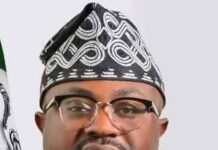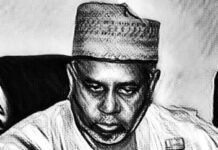
Trump’s USAID Freeze: A Bid to Curb Corruption or a Warning to Africa, by Zekeri Idakwo Laruba
Donald Trump is a polarizing figure, but whether one supports him or not is irrelevant to the undeniable fact that he seems to have an uncanny ability to weather storms. Despite countless controversies and allegations, he has consistently bounced back, even earning the trust of millions of Americans who voted him into office. Love him or loathe him, his recent executive order—reportedly crafted with the assistance of Elon Musk, Trump’s closest ally and head of the Government Efficiency initiative—has sparked significant debate. The order mandates a 90-day audit of USAID, triggering strong reactions, particularly in Africa, where foreign aid has long been viewed as a lifeline.
Trump’s tenacity and fearlessness are traits I deeply admire. In many African countries, including Nigeria, corruption within ministries responsible for humanitarian affairs is rampant. Government funds meant to uplift vulnerable populations are often siphoned into private pockets, with foreign aid becoming a tool for exploitation rather than empowerment. This raises a critical question: Is Trump’s move an anti-corruption measure, or is it a wake-up call for African nations to address systemic issues within their own systems?
Trump’s executive order has forced a reckoning. For decades, corruption has been framed as a uniquely African problem, with foreign aid programs positioning themselves as safeguards against financial mismanagement. Yet, this narrative overlooks an uncomfortable truth: Where do African governments learn these corrupt practices? If funds meant for humanitarian aid consistently end up in the hands of corrupt officials, should donors continue to turn a blind eye?
Take Uganda, for example. Reports suggest that significant portions of U.S. aid money sent to the country have been embezzled by government officials. The U.S. government, perhaps unaware of the full extent of this corruption, has now paused funding pending a thorough investigation. Trump’s order compels African nations to confront these issues head-on, challenging them to rethink their reliance on foreign aid and prioritize accountability.
For years, African nations have called for greater economic independence and control over their resources. Trump’s decision may provide the impetus for African leaders to move away from aid dependency and toward self-sufficiency. While his policies are often criticized as harsh and nationalistic, they could inadvertently drive positive change in Africa by forcing governments to address corruption and invest in sustainable development.
This moment presents an opportunity for African countries to break free from the cycle of dependency that foreign aid has perpetuated. As Walter Rodney argued in *How Europe Underdeveloped Africa*, colonial exploitation left the continent economically crippled. Today, foreign aid often functions as a continuation of this dependency rather than a genuine solution. African nations must work together to combat corruption, strengthen institutions, and invest in their own development.
However, Trump’s move is not without consequences. Humanitarian aid groups worldwide are already feeling the strain. A Nobel Prize-winning migrant rights organization has reported an overwhelming demand for assistance, a Ukrainian NGO fears it will no longer be able to rescue civilians from war zones, and a Ugandan legal aid group has been forced to lay off half its staff. These disruptions highlight the delicate balance between accountability and the urgent need to support vulnerable populations.
The U.S. is the world’s largest donor, having allocated $68 billion in aid in 2023 alone. Trump’s administration has made it clear that these funds will now be “reevaluated and realigned” to serve American interests first. The recent suspension of two senior USAID officials, who reportedly refused to grant the Government Efficiency Department access to secure files, underscores the seriousness of this realignment.
Elon Musk further fueled controversy by labeling USAID as “evil” on his social media platform. Meanwhile, a leaked U.S. State Department memo confirmed that “no further U.S. foreign assistance shall be disbursed in a manner that is not fully aligned with the foreign policy of the president.”
In a recent statement, President Trump expressed strong concerns over USAID’s financial management and alleged corruption:
*“USAID is driving the radical left crazy, and there is nothing they can do about it because the way in which the money has been spent, so much of it fraudulently, is totally unexplainable. The corruption is at levels rarely seen before. Close it down!”*
Trump’s remarks reflect his ongoing scrutiny of U.S. government institutions, particularly those involved in international aid. Whether his call to shut down USAID gains traction remains to be seen, but his comments have undoubtedly intensified the debate over financial accountability within government agencies.
This marks a fundamental shift in how the U.S. engages with international development. While the move may expose corruption within USAID, it also risks leaving vulnerable populations without critical support. The question remains: Is this a necessary step toward accountability, or is it merely another chapter in Trump’s “America First” agenda?
Ultimately, Trump’s decision forces both America and aid-dependent nations to confront uncomfortable truths. African nations must decide whether they will seize this moment to push for real economic independence or continue to rely on a system that has historically failed them. Meanwhile, the U.S. must weigh the long-term consequences of withdrawing aid from the world’s most vulnerable populations.
One thing is certain: Trump’s USAID pause will have global ripple effects that extend far beyond its 90-day audit period. No country is an island, and the decisions made today will shape the future of international development for years to come.
Zekeri Idakwo Laruba is the Assistant Editor with Image Merchants Promotion Limited (IMPR). He can be reached via: idakwozekeri93@gmail.com.

































